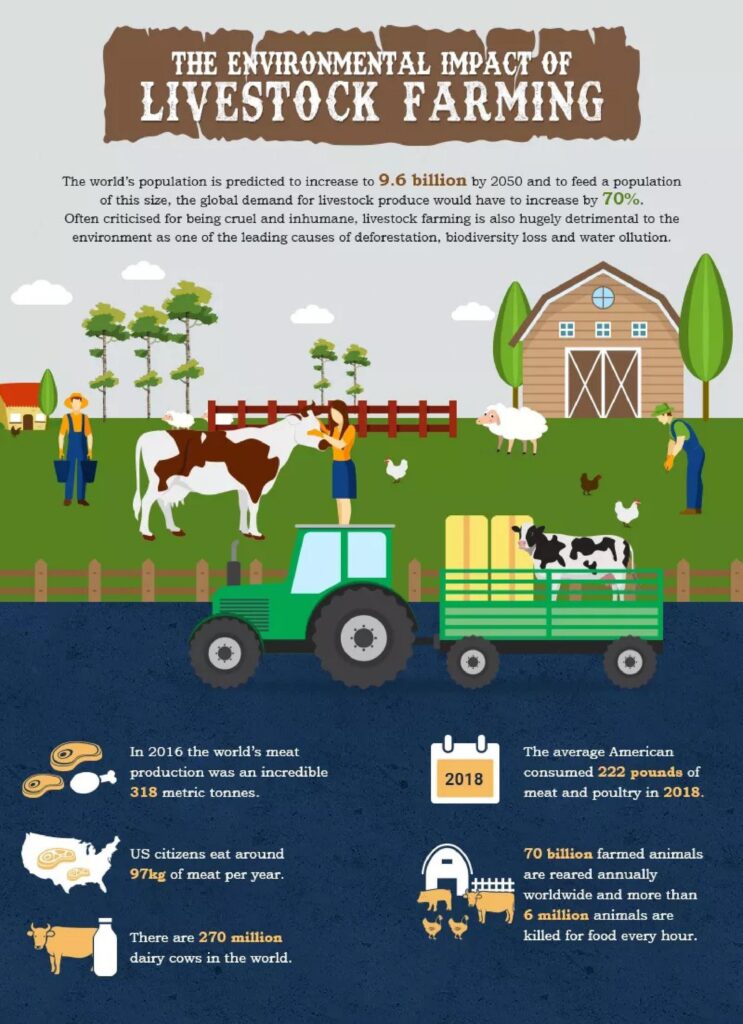

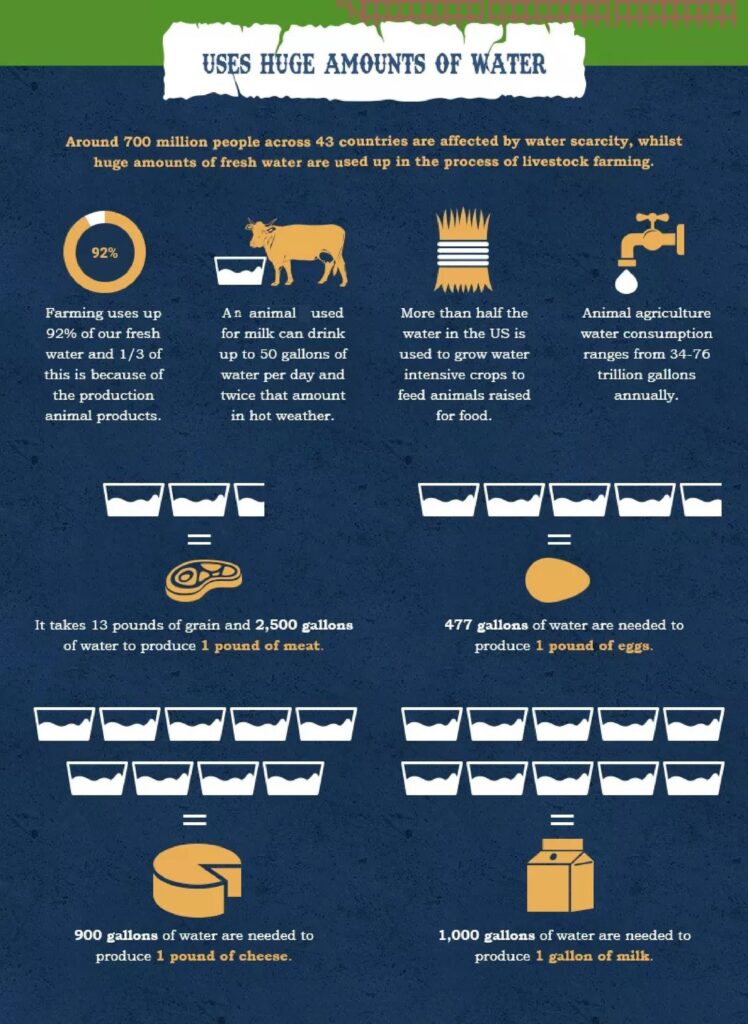
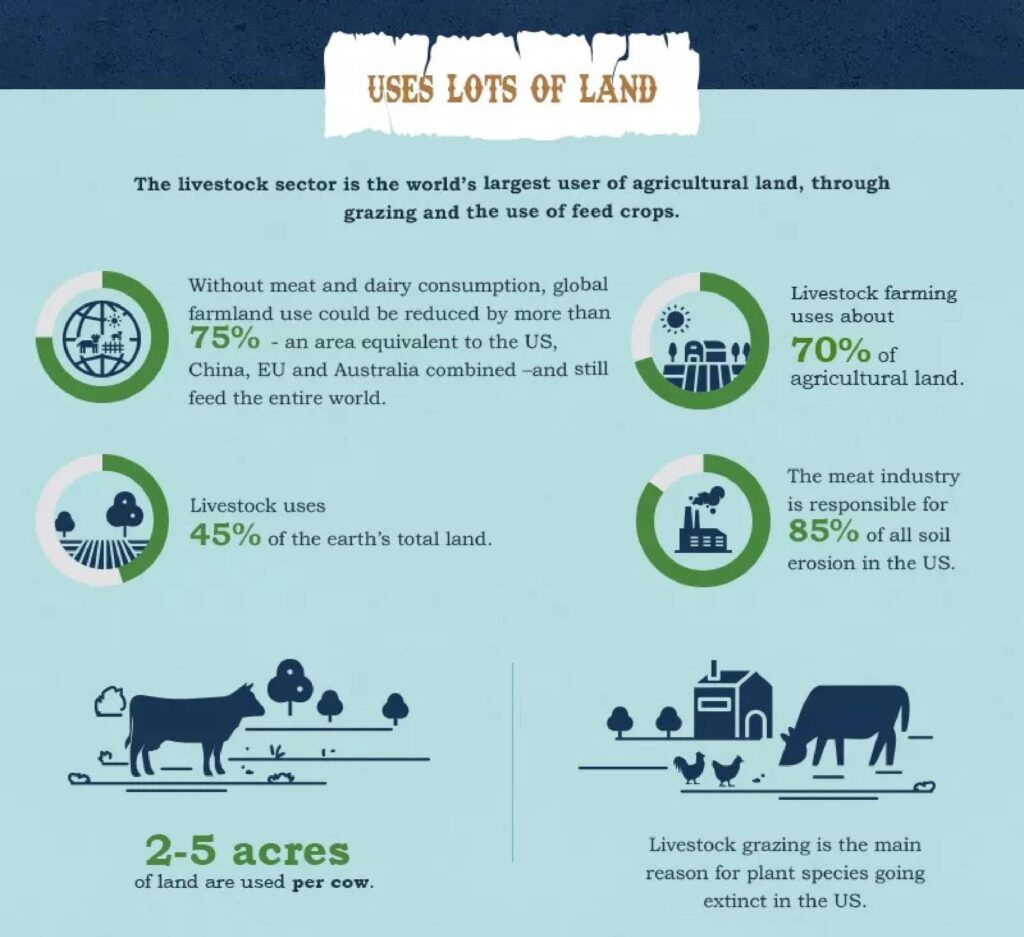
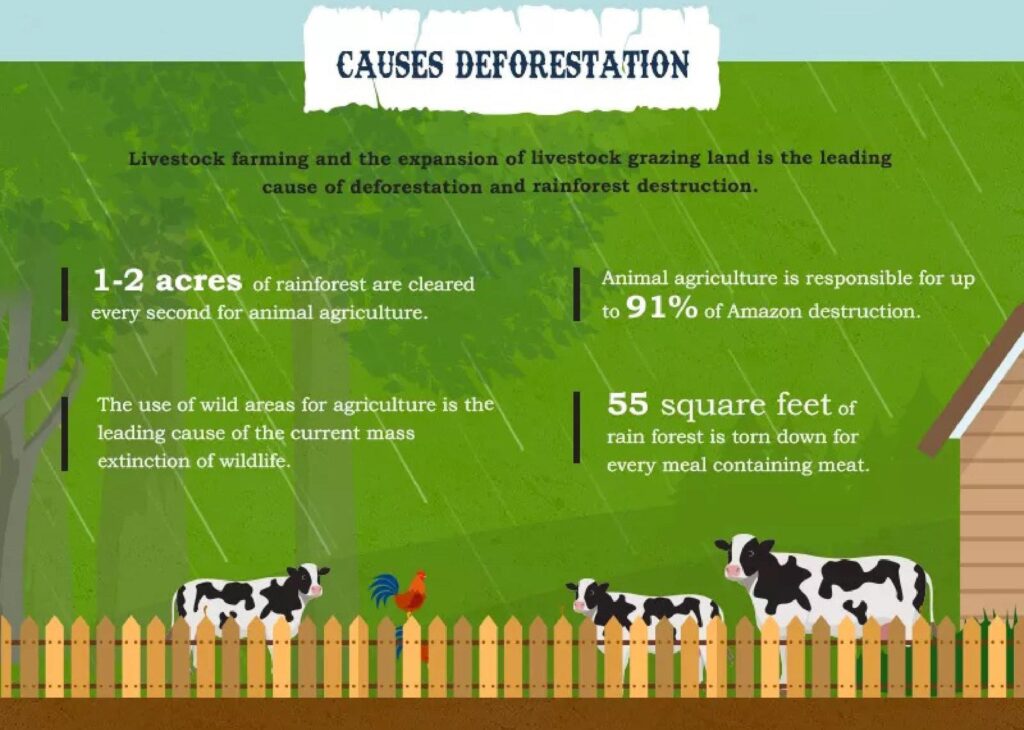
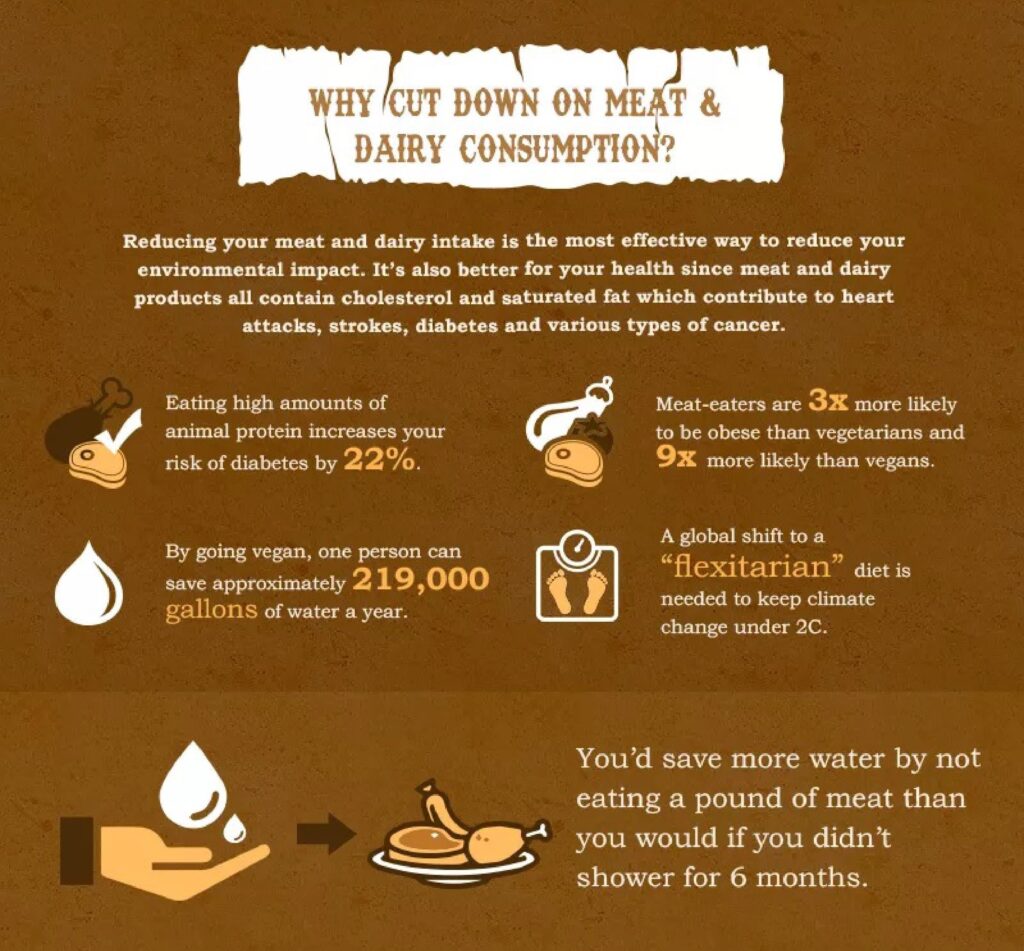
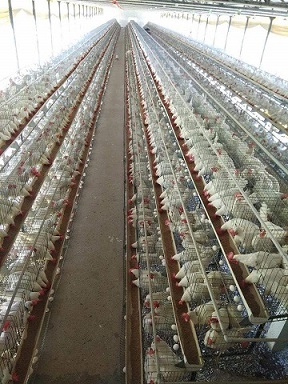
Globally, we eat more meat now than ever before. Cultures that traditionally held vegetarian diets have become steadily more meat-oriented. In many areas, meat is seen not only as a delicacy but also as a luxury expense and a symbol of status. As the production of meat has gone up in recent decades and the cost has steadily dropped, meat is now much more affordable than ever before. This has led to what is referred to as a “Global Meatification of our Diets.”
However, this new trend carries with it a series of environmental burdens. The livestock industry creates enormous amounts of waste, generates pollution, and also releases large amounts of methane into the atmosphere. The world’s growing population is constantly demanding higher levels of livestock products—meat, milk, and eggs—to satisfy an increasing appetite. As people become wealthier, they tend to eat more animal products, and researchers have dubbed the rapidly growing demand for meat and milk the Livestock Revolution.
Livestock are produced in many ways. A pastoralist in India might have a mixed herd of cattle, sheep, and goats grazing across a wide swath of semi-arid land, a smallholder farmer in Vietnam might have some pigs and chickens integrated with her crops, or a major corporation might have an intensive meat production factory in the United States. Around the world, in all of these systems combined, raising livestock accounts for about 80% of all agricultural land and 25-32% of agricultural water use.
When it comes to climate change, livestock contribute to the problem and are also affected by it. An estimated 8-18% of human-caused greenhouse gas (GHG) emissions come from livestock. And as the climate shifts and average temperatures continue to rise, animals will suffer from heat stress, more parasites and diseases, and reduced quality and availability of feed.
A new report from FAO says livestock production contributes to the world’s most pressing environmental problems, including global warming, land degradation, air and water pollution, and loss of biodiversity. Using a methodology that considers the entire commodity chain, it estimates that livestock are responsible for 18 percent of greenhouse gas emissions, a bigger share than that of transport.
Some adverse effect of livestock farming on environment—-
Air pollution ———– Air is one of the major livestock related environmental problems under industrial system. Air pollution has serious repercussions and damage to health occurs as pollutants molecules interact unfavorably with the intricate molecules and fluids of the human body (Ademoroti, 1996). Air pollution and global warming are produced by livestock directly and indirectly. The production of livestock has significantly contributed to the increase levels of CO2 and other greenhouse gases during the past 250 years (Darwin, 2001). About 40% of emitted methane is produced by agriculture predominantly by ruminant animals.
Land degradation ————— Land degradation such as deforestation, soil quality and desertification are excessive global problems. The global assessment of soil degradation, estimates that 680 hectares of rangeland have become degraded. In Nigeria, prolong heavy grazing contributes to the disappearance of edible plant species and subsequent dominance by either inedible, herbaceous plants or bushes. Excessive grazing has also caused soil compaction and erosion, decrease soil fertility and water infiltration and the loss of organic matter content. The recent increase in the rate of desertification may not be unconnected with excessive grazing in Northern Nigeria. Livestock impact on the soil can be classified into two broad categories as reported by Whitmore (2001); physical impact of the animal on the soil as it moves around and secondly, the chemical and biological impact of the feaces and urine that the animal deposits on the soil.
Physical impact—————
Heavy livestock, such as cattle compact soil structures and destroy vegetation on which they graze. Destruction of soil structure and vegetation is harmful because restoration does not occur immediately the grazing animals are withdrawn. The problems with soil structure are not limited to cattle farming. Pig production is notorious for its destructive effects on vegetation as part of the pig’s behavior to dig into the soil in extensive system common among rural farmers.
Chemical and biological impacts of manure and urine —————– Although impacts of livestock manure has been seen to have impact on water and the atmosphere, soil is an intermediary. The urine of Livestock burns vegetation and is often toxic to plant roots which cannot immediately recover to take the nitrogen (full recovery can take up to 12 months) and the problem worse in areas where animals congregate.
Heavy metals———————
Copper and zinc which are essential minerals for livestock diets are deliberately added to concentrate feeds whereas other heavy metals in particular cadmium, are introduced involuntarily via feed phosphates. Only 5 to 15% of metals additive are absorbed by animals, the rest are excreted. Soils on which pig and poultry manures are continuously applied at high rates accumulate heavy metals jeopardizing the good functioning of the soil, contaminating crops and posing human health risk
Socio-economic problems ———- The extensive system of animal production especially by rural poor community in India which houses over 90% of the ruminant animals has continued to pose serious threat to crop farming in India. The migration system imposed upon this ruminant production by climatic factors results in animals trampling and eating existing or growing crops on the field. Some herdsmen most often sent the bush on fire destroying crops and damaging the ecosystem. There have been several reports of clashes between the herdsmen and the crop farmers leading to loss of lives, displacement of settlements and destruction of valuable property.
So to conserve and maintain the ecosystem suitable for all living beings and to overcome these problems, First of all Livestock Farming should be totally banned and the Population of all Living beings (Human & Non Human Animals) should be controlled by using all Scientific Methods & Techniques of Population Control to the extent so that there should be available sufficient Space and resources for the survival of all the Human & Non Human Animals on the Planet Earth.
So the Commodity status of All the Animals should be discarded and All Animals Husbandries should be Changed to “Animals Welfare Departments”.
Therefore it becomes necessary to constitute — “All Living Beings Rights Commission” to Govern the Rights & Limits of all living Beings for the Welfare of All Living Beings and for the Peaceful Co-existence of all living Beings.
The Environmental Impact of Live Stock Farming Video Click Here
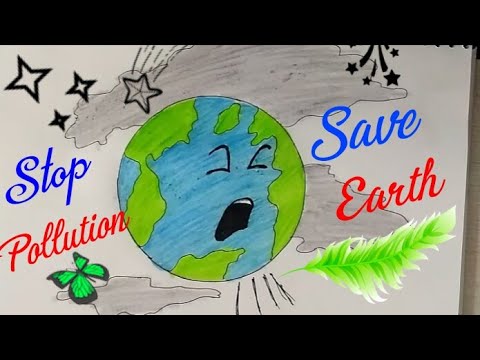
•Pollution is the entry of contaminants into the natural environment which causes adverse changes. Pollution can take the form of chemical substances or energy, such as noise, heat or light. Pollutants, components of pollution, can be either foreign matter/energy or naturally occurring contaminants. Pollution is often classified as point source or non-point source pollution. In 2015, pollution killed 9 million people worldwide. Major forms of pollution include air pollution, light pollution, litter, noise pollution, plastic pollution, soil pollution, radioactive pollution, thermal pollution, visual pollution and water pollution.
•Pollution control is a term used in environmental management. It means control of emissions and wastes in air, water or soil. Without pollution control, waste products, whether accumulated or dispersed, from excessive consumption, heating, agriculture, mining, manufacturing, transportation and other human activities will degrade the environment. In the hierarchy of control, pollution prevention and waste reduction are more desirable than pollution control.
Some more steps may be taken to control the Pollution as mentioned below:
•Manufacturing, Storing &Trading of all the Fire Crackers for the general public should be totally banned & all the licenses issued for the same should be cancelled & should not be issued/renewed further to reduce the Air & Noise Pollution.
•All the products such as Biri/Cigaretts, Tobaco/Gutka/Khaini & Alcohol etc. which reads a warning on its Label like as: “Drinking/Smoking or Consuming of this product is injurious to Health”, should be sold only on the prescription of the Registered Medical Practitioner of any “Nasha Mukti Kendra”. The Doctor in “Nasha Mukti Kendra” should prescribe a safe dose only after the full medical check up of the Drinker/Smoker or the consumer of Tobaco/Gutka etc and after providing a proper counseling to the consumer of these type of products. So that due to the consuming of these types of products nobody should be get Harmed Physically or Mentally nor anybody should become Habitual of these type of products. So without the Prescription of an Authorized Doctor, the sale of any of these products should not be allowed.
Types of Pollution: Video: Click Here
Tobacco: How it Kills Video: Click Here
Alcohol Addiction Video: Click Here
Alcohol, Health and Well-being Video: Click Here
Maximum alternate resources of Wood should be adopted to save the Trees. It should be mandatory for all the Owners of all Domestic/Commercial lands/Buildings of more than 500 Sq. Yards to utilize at least 20% Land of the Total Owned Land for Agriculture purpose to grow Food Grains, Cereals, Fruits & Vegetables, Plants & Trees etc.
Forests for Nature: Video: Click Here
Deforestation I Eco Facts I Video: Click Here
More over some scheduling of Offices & Markets timings may also be done in all Metro Cities & other Big Urban Areas to prevent over crowding & to control the Traffic & Noise Pollution as follows:—
•For all Schools, Colleges, Universities & all other Educational Institutions (Coaching Centers etc.) timings may be fixed from 9.00 A.M. to 3.00 P.M. & 4.00 P.M. to 10.00 P.M. as per the convenience of the Students & the concerned Professionals. More & more emphasis should be given on providing the Education Online.
(Total Five Working Days in a Week, Six Hrs. Daily for Everyone).
•For All Offices & Industries/Production Houses timings may be fixed from 10.00 A.M. to 4.00 P.M. and 2nd shift timings may be fixed in the Night from 10.00 P.M. to 4.00 A.M. if required.
Maximum Product & Services should be provided to the General Public at their door step by the employees of each & every Department either Online/Offline. All the Applications & issues should be submitted/raised Online by the General Public & All these should be resolved by the Executives of the concerned Departments at the doorstep of all the people Online/Offline. No body from General Public should be needed to visit any Office for their work until Visiting to the concerned Office is necessary to reduce the situation of Traffic Jam & Pollution and the wastage of time of the general Public.
More over it should be mandatory for all Public & Private Companies/ Corporate to adopt the Hybrid Working Model for their Employees i.e. Part time work from Home Online & Pat time work at the Office. By this method, it will help in reducing the traffic jam & the Pollution and in saving the energy (Petrol, Diesel, Gas & Electricity etc.). It will also help to all the employees to raise, nurture & Care fore their families very conveniently.
But All Govt. Offices & Industries should be opened for all the Seven days of the Week.
Two Weekly Offs should be given to each & every Employee as per the Weekly duty roaster as set by the corresponding Department.
(Total Five Working Days in a Week, Six Hrs. Daily for each Employee) .
•Similarly Markets timings may be fixed from 11.00 A.M. to 5.00 P.M.
All markets should be remain open for all days of the Week.
(Total Five Working Days in a Week, Six Hrs. Daily for Every Shopkeeper).
Not more than 30% shops of a particular Segment of a particular Market should be closed on any Day due to Weekly Offs to avoid the un availability of Products & Services to Customers and for their convenience.
From 6.00 P.M. to 9.00 P.M. Sanitization & Cleaning work should be done through out the Markets, all roads & all Streets.
•For all BPO & Call Centre Services timings may be adjusted as per the International Timings.
(Total Five Working Days in a Week, Six Hrs. Daily for each Employee)
• From 10.00 P.M. to 4.00 P.M. timings For All other Heavy Load Road Vehicles may be fixed to reduce the Road Jam Situation.
•All Emergency, Essential & Entertainment Services e.g. Medical & Allied Services, Bank ATM & Money Transfer Services, Hotel & Restaurants/Dhaba’s, Canteens, Transportation, Safety/Security, Housekeeping/Health & Hygiene related Services, Malls & Cinema Halls etc. may be allowed to open for 24*7 days.
(Total Five Working Days in a Week, Six Hrs. Daily for each Employee)
•No Rally, procession etc. should be allowed throughout the main Markets & the main Residential Areas to avoid the Traffic Jam & the Crowd.
•All the Schools, Colleges/Universities, Banquet Halls, Hotels, Restaurants/ Dhabas, Cinema Halls, Malls, Religious Buildings/Places etc. should be outside the Cities/ Villages at least One Kilometer far from the main Residential Areas & the main Markets to avoid the Traffic Jams, Noise & Conflicts among the people of different Communities living in the neighborhood.
•Main Focus should be on “Vocal for Local”, this will help in reducing the Pollution as well as the Transportation cost of the goods which in turn will result in availability of cheap & best quality of Products & generate employment for Local workers.
For Waste Management some more steps may also be adopted as follows:—
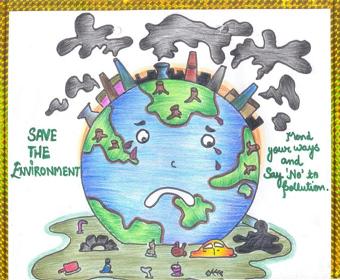
•There should be a Centralized Department for–
“Pollution Control & Waste Management” which should have District/Block wise Fully Equipped Plants in each State through out the Country for Pollution Control & Waste management in a Scientific way.
•It should be mandatory for all the Manufacturers to submit the complete SOP for the disposal of the waste of their product. Without complete SOP of the disposal, no license should be issued/renewed for the manufacturing of any product.
•It should be the responsibility of all the Panchayats & M.C.’s of the corresponding Block to collect & deposit all the waste materials to the nearest “Pollution Control & Waste Management Department”. So that it can be finally disposed off or modified/utilized for further use there.
•All the Waste Materials which remains useless may be utilized in making Roads, Streets, Dams, Mountains or to fill the pits to manage the Level of the Earth at any place as per the requirements.
Prevention from Natural Disasters
Why climate change makes extreme weather worse: Video: Click Here
Scientists Can Now Prove That Climate Change Is Causing Natural Disasters: Video: Click Here
How climate change is fueling natural disasters around the globe: Video: Click Here
To prevent from Natural Disasters some more steps may be followed along with Pollution Control as follows:
•All the Cities which are situated nearby the Sea or Big Rivers where a huge losses occur due to flood, storms & cyclones again & again should be shifted/Evacuated.
•In these Evacuated areas along side the Sea & Big Rivers more & more Plants & Trees should be planted and all the flooded water should be controlled through the Dams & small rivers and should be supplied to dry areas or where it is required through small Rivers or under ground Pipes etc. All the waste materials may be utilized to build the Dams & Rivers or to fill the pits etc.
•There should be some facilities of Water Harvesting and its Conservation, Water Treatment Plants in each & every City to avoid the Floods & Losses due to heavy rains & from where water can be supplied where ever it is required.
•Similarly to prevent from the losses due to Earth Quacks, All the old Buildings which are in bad condition should be demolished. All old colonies which are situated in crowded areas should be resettled & Developed again with proper planning.
•All colonies in slum areas should be resettled & Developed again with the proper planning.
Some Documentary Films on Pollution Control & Waste Management:
- Pollution Control Documentary Film Click Here
- Climate Change Click Here
- Fantastic Plastic | Awareness Documentary Click Here
